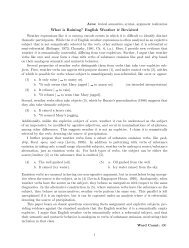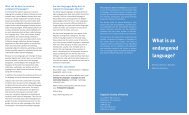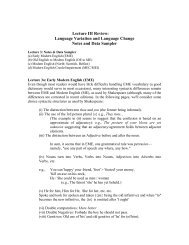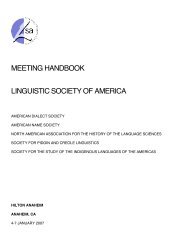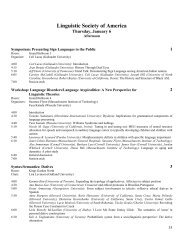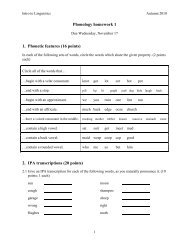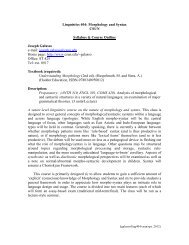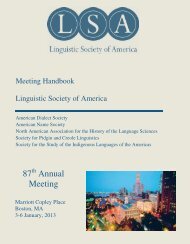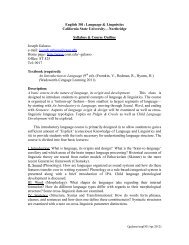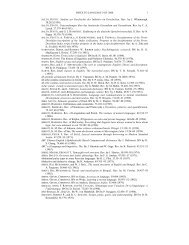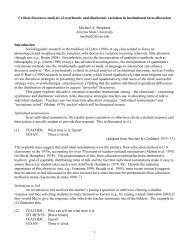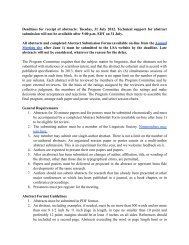here - Linguistic Society of America
here - Linguistic Society of America
here - Linguistic Society of America
Create successful ePaper yourself
Turn your PDF publications into a flip-book with our unique Google optimized e-Paper software.
Bradley Hoot (DePaul University) Session 34Focus marked by stress shift in Spanish: experimental evidenceIn Spanish, it is most commonly claimed that constituents in narrow presentational focus appear rightmost, w<strong>here</strong> they also getmain stress, while shifting the stress to the focused constituent in situ is infelicitous. The results <strong>of</strong> a contextualized acceptabilityjudgment experiment conducted with 56 native speakers <strong>of</strong> Mexican Spanish, however, indicate that stress shift is in fact apossible strategy for marking focus in Spanish, contrary to the consensus in the literature. These results indicate that someprevious accounts <strong>of</strong> focus and the prosody/syntax interface in Spanish may need to be revised.Zong-Rong Huang (National Taiwan University) Session 41Two adpositional predicates in Mayrinax Atayal: predicate selection and further implicationsThis study investigates the existential, locative, and possessive constructions in Mayrinax Atayal, a Formosan language. The twopredicates (kia’ and hani’an) characterizing the three constructions are complex adpositions, showing the distality/proximitycontrast. Evidence also shows that the existential absolutive and the locative absolutive stay in different structural positions acrossthe existential closure. This fact indicates that absolutives do not necessarily appear in the CP domain and can be nonpresuppositional.Denis Huschka (German Institute for Economic Research/Rhodes University/ Session 60German Data Forum)Anja Bruhn (University <strong>of</strong> Potsdam/German Data Forum)Gert G. Wagner (Max Planck Institute for Human Development/German Institute for Economic Research(DIW Berlin)/Berlin University <strong>of</strong> Technology (TUB)/German Data Forum)Socio-economic influences on naming choices in GermanyOur contribution focuses on the influence <strong>of</strong> socioeconomic determinants on modern naming practices in Germany usingempirical data from a representative longitudinal study (SOEP). Blooth<strong>of</strong>t and Onland (2011) presented statistical evidence forthe Netherlands showing that parents sharing name preferences also share socioeconomic determinants. In our study, we analyzewhether such a relationship can be observed for Germany as well. Several international papers on names and naming suggest thatespecially education influence parents’ choices for their children’s names but also income might be important as well – althougheducation and income being highly correlated with each other.Stanley Insler (Yale University) Session 77Yale linguistics in the 1950s and 1960sWorking from my more than 50 years with a connection to linguistics at Yale University, I address <strong>here</strong> several key aspects andpersonages that helped to make Yale linguistics what it was in the 1950s and 1960s, looking at both the intellectual questions thatdrove the department and the individual personalities involved. Among other things, I plan to discuss my own experiences withfigures such as Bernard Bloch, Paul Thieme, and Rulon Wells, and to give a first-hand account <strong>of</strong> life in the Yale linguisticsprogram, both as a student and as a faculty member in that period.Ana C. Iraheta (University <strong>of</strong> Minnesota) Session 7Descriptive and acoustic account <strong>of</strong> Salvadoran interdental realization <strong>of</strong> /s/This paper provides a descriptive and acoustic analysis <strong>of</strong> the linguistic variables that favor the interdental realization <strong>of</strong> /s/ inSalvadoran Spanish, an understudied variety. Accounts <strong>of</strong> /s/ realizations within this variety have reported phoneticcharacteristics <strong>of</strong> [s], [h], [Ø], and <strong>of</strong> an interdental-like allophone [θ] which is not correlated with the /s/ and /θ/ differentiation inparts <strong>of</strong> Spain. Neither a systematic pattern <strong>of</strong> [θ] occurrence nor an explanation as to the linguistic nature <strong>of</strong> such realization hasbeen reported. Analysis <strong>of</strong> samples collected by the author show that syllable initial position favors the interdental when thefollowing segment is an unstressed vowel.161



